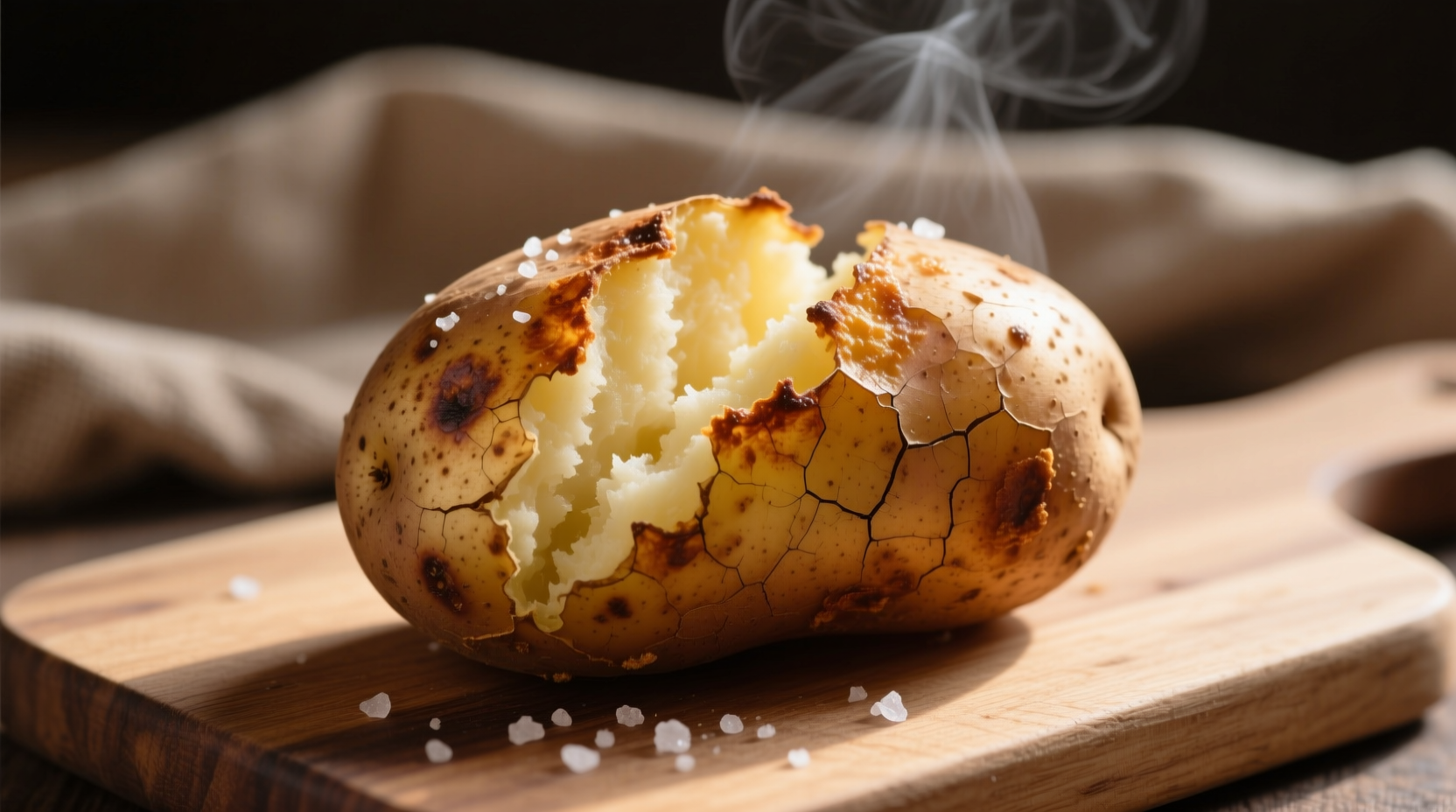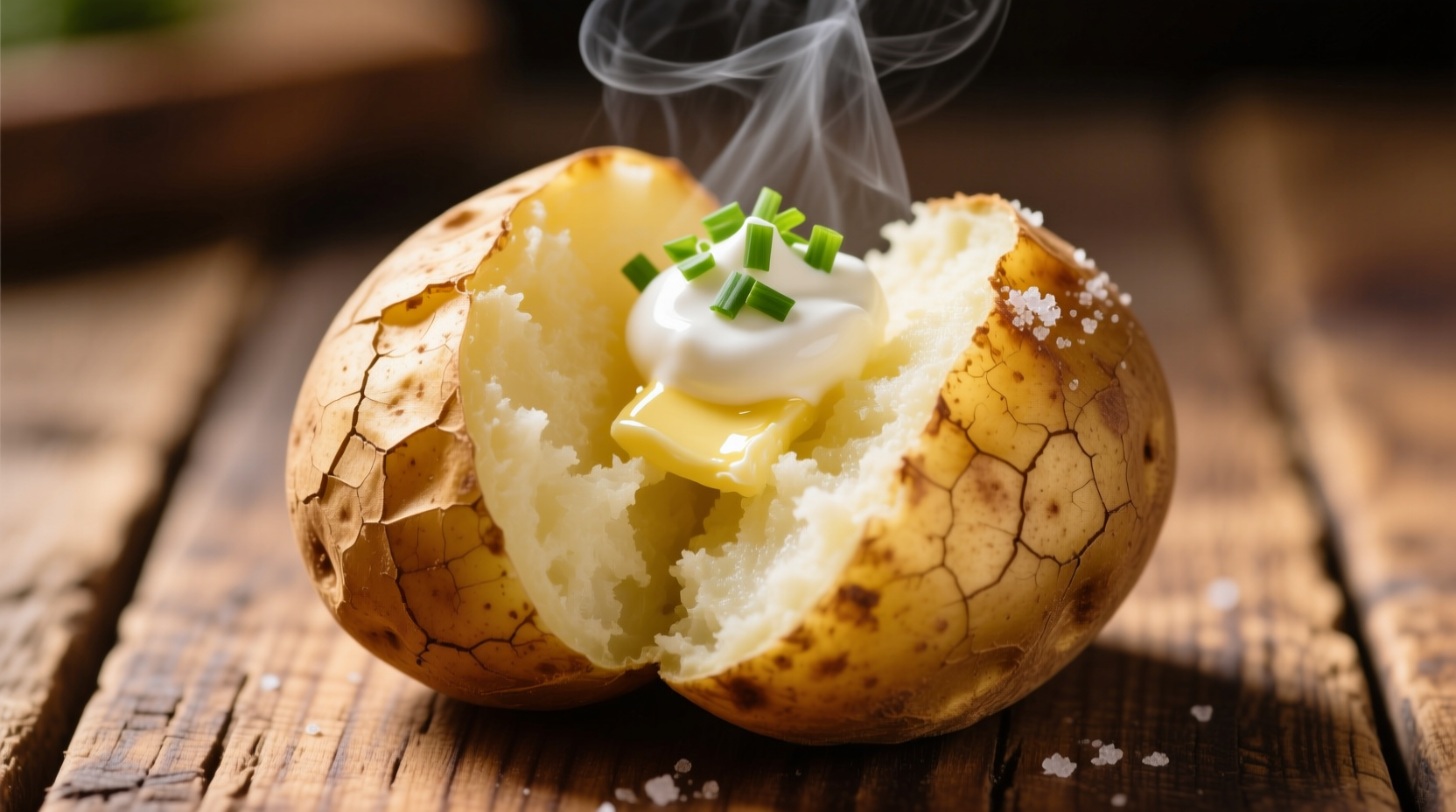The perfect baked potato requires selecting Russet potatoes, thoroughly cleaning them, piercing the skin 4-5 times, and baking at 400°F (204°C) for 45-60 minutes until the internal temperature reaches 205-210°F (96-99°C). For crispier skin, rub with oil and sprinkle with salt before baking. Never wrap potatoes in foil as it creates steamed, soggy results instead of fluffy interiors.
Nothing beats a perfectly baked potato—fluffy interior, crisp skin, and ready to transform into your favorite meal. Whether you're craving a classic loaded baked potato or need a versatile side dish, mastering this kitchen staple elevates your cooking game. Professional chefs achieve consistent results by understanding the science behind the process, not just following basic instructions. This guide reveals the precise techniques that guarantee perfect baked potatoes every time, based on culinary science and professional kitchen experience.
The Science Behind Perfect Baked Potatoes
Understanding what happens inside your potato during baking transforms your results. As potatoes heat, two critical processes occur: starch gelatinization begins at 140°F (60°C), absorbing water and expanding, while the Maillard reaction creates complex flavors at higher temperatures. The ideal internal temperature range of 205-210°F (96-99°C) ensures complete starch conversion without drying out the potato. Baking at 400°F creates the optimal environment for these reactions while preventing the exterior from burning before the interior cooks through.
| Temperature Stage | Internal Process | Visual/Sensory Indicator |
|---|---|---|
| 140°F (60°C) | Starch gelatinization begins | Potato starts softening |
| 185°F (85°C) | Cell walls break down | Fork begins to pierce easily |
| 205-210°F (96-99°C) | Complete starch conversion | Fluffy, dry texture throughout |
Selecting the Right Potato
Not all potatoes bake equally well. Russets (Idaho potatoes) contain the highest starch content and lowest moisture, creating that signature fluffy texture. Their thick skin crisps beautifully while protecting the interior. Yukon Golds work as a second choice for creamier results, while red potatoes generally produce denser, waxier outcomes better suited for boiling. Always select uniform-sized potatoes (about 8-10 ounces each) for consistent cooking times.
Essential Preparation Steps
Proper preparation makes the difference between good and exceptional baked potatoes:
- Clean thoroughly: Scrub potatoes under cold water to remove dirt (never use soap)
- Dry completely: Moisture prevents crisp skin formation
- Pierce strategically: Use a fork to make 4-5 deep punctures to allow steam escape
- Salt wisely: For restaurant-style crisp skin, rub with 1 tsp oil and coarse salt

Optimal Baking Method
Follow these precise steps for foolproof results:
- Preheat oven to 400°F (204°C) with rack in center position
- Prepare potatoes as described in preparation steps
- Place directly on oven rack with baking sheet on lower rack to catch drips
- Bake 45-60 minutes (depending on size) until internal temperature reaches 205-210°F
- Remove and let rest 5 minutes before serving
For even cooking, rotate potatoes halfway through baking. Larger potatoes (over 12 ounces) may require up to 75 minutes. Always verify doneness with an instant-read thermometer rather than guessing by time alone.
Avoiding Common Baking Mistakes
Professional kitchens avoid these critical errors that ruin baked potatoes:
- Foil wrapping: Creates steamed potatoes with soggy skin (USDA Food Safety guidelines confirm foil traps moisture)
- Insufficient piercing: Causes potatoes to explode from built-up steam pressure
- Incorrect temperature: Baking below 375°F yields dense, undercooked centers
- Skipping the rest period: Cutting immediately releases trapped steam, making potatoes gummy
Flavor Variations and Serving Suggestions
Elevate your baked potato with these chef-approved techniques:
- Herb-infused oil rub: Mix olive oil with rosemary or thyme before baking
- Garlic butter injection: After baking, slice open and insert garlic butter cubes
- Cheese infusion: During last 10 minutes of baking, cut a slit and insert cheese
- Texture contrast: Top with crunchy bacon, green onions, and sour cream
Storage and Reheating Guidelines
Proper storage maintains quality for leftovers:
- Cool completely before refrigerating (within 2 hours of baking)
- Store uncovered in refrigerator for up to 5 days
- Reheat in 350°F oven for 15-20 minutes (microwaving makes skin rubbery)
- For frozen potatoes, wrap individually and use within 6 months
Troubleshooting Guide
Solve common baked potato problems with these solutions:
- Soggy skin: Didn't dry potatoes thoroughly or used foil; next time skip foil and ensure complete drying
- Dense center: Undercooked; increase temperature to 425°F and verify internal temperature
- Burnt exterior: Oven too hot; reduce to 375°F and extend cooking time
- Uneven cooking: Potatoes weren't uniform size; group similar sizes together next time











 浙公网安备
33010002000092号
浙公网安备
33010002000092号 浙B2-20120091-4
浙B2-20120091-4